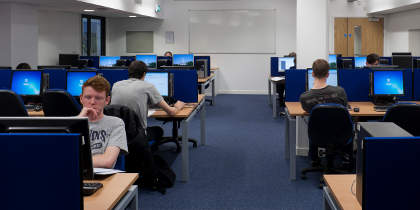
January 31, 2009, by Teaching at Nottingham
Developing subject specific internet training sessions
Christian Haase: “In recent years, the Higher Education Academy, JISC, the University of Nottingham and other bodies have introduced new training sessions to encourage a more reflective use of the web. A number of studies suggest that such learning modules will reduce “copy and paste” plagiarism. However, it is questionable to what extent the new training sessions have filtered down to departmental level. In the PGCHE project, I decided to analyse the ability of history students to critically evaluate web-sites. The findings of the project suggest that internet training across the university should be conducted in a more subject-specific manner.
“I analysed the skills of history students to critically evaluate web-sites with a combined quantitative and qualitative analysis. I extracted the data for history students from my PGCHE Group Project on “Understanding Undergraduate Research Strategies” and ran a separate analysis with a particular focus on internet resources. In the project, we interviewed 330 students from the Humanities from Year 1, 2 and 3 with a standardised questionnaire. History students ranked the internet as the fourth most important source out of 7 (Humanities: Rank 3). However, I probed deeper than in the Group project and asked the students of a 3rd Year Module (n=21) to footnote all sources they were using. Consequently, I received a higher number of URLs in footnotes in the next essay. The additional data drawn from essay bibliographies thus indicated that the “internet” is not only an important source of information, but is used as an easily available background source, which often does not show up in bibliographies and footnotes. This in turn makes it much harder for lecturers to review the sources the students are using and to train them appropriately. This was of particular concern to me because source analysis is one of the key transferable skills we teach our students in the school of history.
“Thus, I decided to follow up the quantitative with a qualitative analysis designed to show what the students did when faced with information on the internet. I asked for volunteers from a group of 350 students. 32 volunteered for two special sessions designed as “Learning sessions on internet resources for historians”. In the two documented 1 hr tutorials I asked the students to “google” the word “Hitler” and to evaluate the first web-site that the Google search engine brought up. 30 out of 32 students failed to spot that the web-site www.Hitler.org was a Holocaust denial site. Furthermore, the students were hardly able to spot that web-sites can be treated like any other written document. It took them more than 15 minutes to realise that it may be worthwhile to ask: who is the publisher, who is the author, when was the information written etc. The standard teaching material of the Higher Education Academy clearly had not filtered down to our students. The missing skills of our students had been overlooked in the school of history.
“Based on these findings, I developed a subject-specific learning session, which I presented at the department’s Teaching Away Day. The main aim of the presentation was to raise awareness among staff. The developed session aimed to encourage students to transfer their assessment skills of primary and secondary sources (author, publisher, year of publication, references, context, background, bias, audience etc.) to the internet and to train them to use more specialised search strategies to get access to high quality historical material on the internet (subject gateways, e-journals etc.). I am currently conducting another quantitative survey of more than 80 history students in order to detect any changes since the initial survey and the introduction of the teaching sessions in 2006. The results will be presented at the Teaching and Learning Conference in January 2009. The initial data suggest a moderate improvement of the students’ internet skills.
“The analysis of this project indicates that
a) the usage of the internet as a source of information may be higher than statistical data and biographies attached to essays suggest,
b) that our “catch all” approach to internet training may still be too broad and
c) that it is fruitful to reflect on subject specific approaches to enhance a more reflective use of the web.”
Paper presented at the University’s Fourteenth Learning & Teaching conference (January, 2009).
Dr Christian Haase
Lecturer in Modern German History
School of History
This article was originally published as part of PESL’s Teaching at Nottingham collection.
No comments yet, fill out a comment to be the first

Leave a Reply